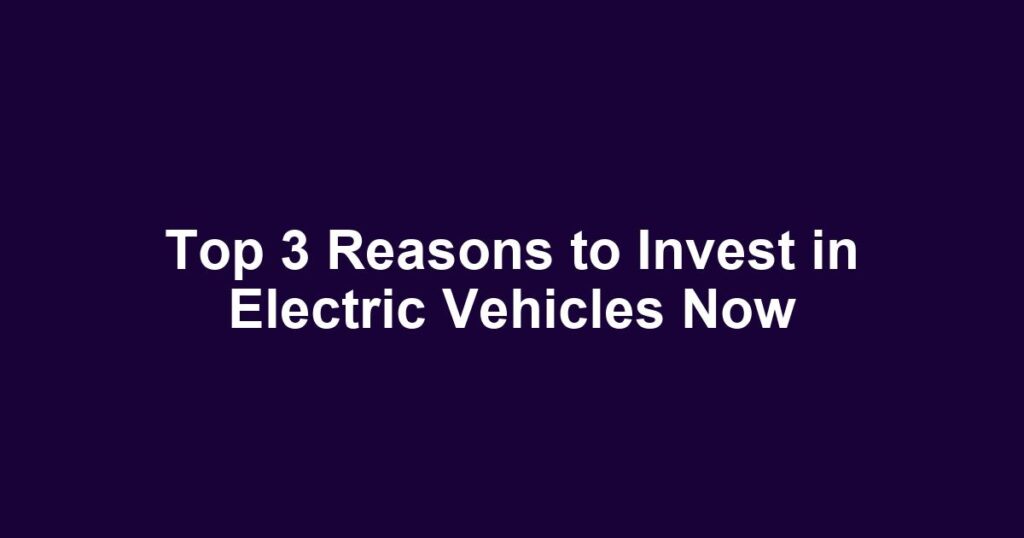Top 3 Reasons to Invest in Electric Vehicles Now
The automotive industry is undergoing a revolutionary transformation, and at the forefront of this change are electric vehicles (EVs). As the world becomes more conscious of sustainability and environmental impact, electric vehicles are not just a trend—they are becoming essential for a greener future. If you are contemplating whether to jump on the EV bandwagon, let’s explore the top three reasons to invest in electric vehicles now.
1. Environmental Sustainability
One of the most compelling reasons to invest in electric vehicles is their potential to significantly reduce carbon emissions. With increasing concerns about climate change, many consumers are looking for ways to contribute to a more sustainable future. Here’s how electric vehicles play a critical role:
Reduction in Greenhouse Gas Emissions
- Electric vehicles produce zero tailpipe emissions, meaning they do not release harmful pollutants that contribute to air quality degradation.
- While the production of electricity can involve fossil fuels, the overall emissions from using EVs are typically less than those from traditional gasoline or diesel vehicles.
Supporting Renewable Energy
Investing in electric vehicles goes hand-in-hand with the growth of renewable energy sources. Many EV owners charge their vehicles using solar or wind energy, which further reduces their carbon footprint. This shift supports the development of sustainable energy infrastructures.
2. Financial Incentives and Cost Savings
Beyond the environmental benefits, there are also significant financial incentives for investing in electric vehicles. Cost-effective advantages can not be overlooked:
Government Incentives
- Many governments around the world offer tax credits, rebates, and grants to encourage the adoption of electric vehicles. These financial incentives can substantially lower the upfront costs of purchasing an EV.
- In some regions, reduced registration fees and exemptions from tolls are also available for electric vehicle owners.
Lower Operating Costs
Electric vehicles are generally cheaper to maintain and operate compared to conventional vehicles. Here’s why:
- EVs have fewer moving parts, which means fewer potential points of failure and lower maintenance costs.
- The cost of electricity to charge an EV is often significantly lower than the cost of gasoline or diesel fuel, allowing drivers to save money with each mile driven.
3. Technological Advancements and Market Trends
The electric vehicle market is dynamic and rapidly evolving. Keeping tabs on the latest technology trends can help you make an informed investment decision. Here’s what you need to know:
Rapid Improvements in Battery Technology
Advancements in battery technology are critical to the electric vehicle ecosystem. Significant improvements include:
- Increased range: Modern electric vehicles can often travel over 300 miles on a single charge, reducing range anxiety.
- Faster charging: Innovations such as fast-charging stations can recharge EV batteries in under an hour, making EVs more convenient for long trips.
Growing Market Demand
Consumer interest in electric vehicles is surging, driven by various factors:
- Increased awareness of climate issues and sustainability is leading many buyers to prioritize eco-friendly options.
- Automakers are shifting focus to electrification, with many traditional brands announcing plans to produce a wide range of EV models.
Frequently Asked Questions about Electric Vehicles
What is the average cost of an electric vehicle?
The average cost of an electric vehicle can vary significantly based on the make and model, but many EVs start around $30,000-$40,000. However, with various incentives, the effective price can often be lower.
How does charging an electric vehicle work?
Electric vehicles can be charged at home using a standard wall outlet or a dedicated home charging station. Additionally, public charging stations are becoming more prevalent, making it convenient to charge on the go.
Why does investing in electric vehicles make financial sense?
Investing in electric vehicles can lead to savings in fuel and maintenance costs, enhanced resale value, and potential tax incentives, making EVs a smart financial option.
Conclusion
With the urgent need for sustainability, financial advantages, and exciting technological advancements, now is the perfect time to consider investing in electric vehicles. By making this choice, you are not just participating in a growing trend; you are playing a part in a substantial movement toward a more sustainable and environmentally-friendly future.
If you are ready to take the next step in your investment journey, explore local EV options today, and consider how you can make a positive impact through your purchase. Investing in electric vehicles is more than just a financial choice; it is a commitment to a better world.
Call to Action
If you found this article helpful, share it with friends and family who might also be considering investing in electric vehicles. Let’s start a conversation on sustainability and how we can all contribute to a greener future!

